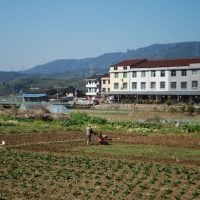NGOs and MPs have urged the Government to act “without delay” on its pledge on protecting child refugees, after it emerged that children as young as 10 were enduring freezing temperatures sleeping rough across Europe. In a letter to Home Secretary, Amber Rudd, 150 signatories and NGOs asked the government to fill all the 480 places promised for unaccompanied minors under the Dubs Amendment, before the end of the year.
Further they also asked for the acceleration in family reunions for lone children with family in Britain and that the youngsters who are currently waiting many months to access this legal route are often falling into the hands of smugglers and traffickers. The renewed appeal comes after the first unaccompanied child stranded in Greece arrived in the UK – a year and a half after the Home Office pledged to bring hundreds to safety. The Home Office had accepted that the boy was vulnerable and eligible for transfer 16 months ago.
Responding to the letter, a Home Office spokesperson said, “We remain committed to transferring 480 children from Europe to the UK under section 67 of the Immigration Act. We have accepted further referrals this year and transfers are ongoing. We will continue to work closely with EU partners and local authorities to transfer eligible children here quickly and safely.
He further said, “In addition, our wider focus remains helping those in need of international protection in the region, which is why we have committed to resettle up to 23,000 refugees from the region – more than 9,000 are already rebuilding their lives in the UK and the Government has pledged £2.46bn to the humanitarian response to the Syria conflict.”
The UK gave sanctuary to 200 children under the Dubs provision during the demolition of the Calais “jungle” in October 2016. But since then, no children have been transferred from the north of France under the legislation. Despite the fact still there are around 100 lone minors presently sleeping rough in Calais. Volunteers working on the ground say one of them, an unaccompanied Afghan boy, is just 10-years-old, and is currently sleeping between two trees.
After the repeated pressures from charities and an onslaught of freezing temperatures, the authorities in Calais opened sheltered accommodation in a warehouse with capacity for a total of 270 people. But still between 600 and 700 refugees in the area are stranded whereas many are still sleeping outside in the rain and snow.
Working on the ground in Calais with charity Help Refugees, Annie Gavrilescu told The Independent, “It’s really freezing. There’s a lot of snow and rain. It’s not the nice kind of snow, its bitter cold and miserable. People don’t sleep very much in the night. It’s impossible – it’s too cold and wet. And then they’ve also got police often coming and removing any makeshift shelters they’ve made. We’re seeing signs of hyperthermia. People are very pale, sometimes they have slurred speech and get very faint.
She further said, “You can definitely sense how the mood has gone down even further. It’s just really desperate and despondent. We’ve always said we want the places filled by the time this big freeze comes. It’s now here, and kids as young as 10 have to sleep outside. The previous transfer of 200 children in 2016 proves that our Home Office and our Government are able and willing to follow a proud tradition of being a safe haven for child refugees. Knowing that at least four children lost their lives last year at our border in Calais before the Amendment was implemented is heartbreaking, and we cannot let this happen again.”
The letter also urges that according to the EU-Turkey deal, eligibility deadline of 20 March 2016 should be reconsidered, as currently only children who arrived in Europe before this date are considered eligible under Dubs which means many who arrived more recently are not being considered for the scheme.
UK has a duty to safeguard refugees from the dangers posed by exploitative criminal networks before they reach Britain. Not only this, their involvement in anti-exploitation and anti-trafficking efforts in northern France must also be renewed and reinforced.
According to the recent research by Refugee Rights Data Project indicates that the majority of child refugees in Calais are facing sustained and increasingly brutal forms of police violence as well as abuse by civilians, with many also suffering from untreated mental and physical health problems.









































